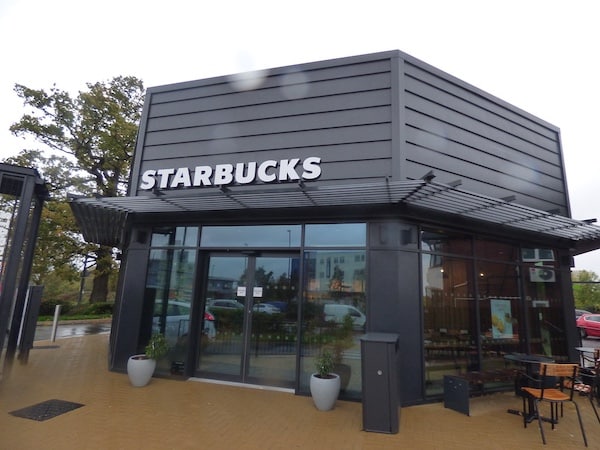Starbucks, the largest coffee chain in the world and the 120th richest corporation in the United States, is being brought to court after being exposed for using slave labor in their coffee production chain.
International Rights Advocates has sued Starbucks on behalf of eight Brazilian plaintiffs who were trafficked and forced into modern day slavery on coffee plantations that supply a major percentage of Starbucks’ coffee imports. IRAdvocates, which has previously launched lawsuits against Chiquita for financing death squads against labor activists in Colombia, have partnered with Coffee Watch, an NGO that aims to reform coffee production to prevent labor violations, to launch a broad campaign to file a lawsuit against Starbucks and to petition Customs and Border Patrol to block Starbucks’ Brazilian coffee imports. IRAdvocates’ lawsuit, which seeks to represent thousands of workers facing similar conditions, aims to hold Starbucks accountable after years of documented abuses and reports of modern slave-labor. Workers reported facing threats of death if they quit their jobs or reported the conditions imposed on them by Coxuupé, Starbucks’ main Brazilian supplier.
For years, Starbucks has dodged accusations and reports documenting similar treatment of laborers. A report by Repórter Brasil, cited in the lawsuit filed by IRAdvocates, uncovered hundreds of documented cases of illegal child labor and enslaved Afro-Brazilian labor in the state of Minas Gerais. Minas Gerais produces two-thirds of all Brazilian coffee, with more than 8 million tons going directly to the coffee giant.
Starbucks has long relied on its brand image to boost its sales, from “ethical sourcing” to being supportive of its LGBTQ+ workers. However, the company’s claims are nothing more than an attempt to boost its bottom line and reap in billions in profit. At one time claiming to be “100% ethically sourced” compared to its peers in the coffee industry, the coffee giant was sued for false claims as more evidence was uncovered in their production chain. In fact, Starbucks has been sued for using child labor in Guatemala, and contracting tea farms in Kenya with rampant sexual abuse. Starbucks has also benefited from prison labor in the United States too through contracting a company known to hire inmates to package its coffee beans!
Starbucks “verifies” their sourcing through what they call “C.A.F.E. (Coffee and Farmer Equity) Practices.” This audit system is supposedly judged through four criteria areas: Economic Transparency, Social Responsibility, Environmental Leadership, and Quality. Yet, according to the report by Repórter Brasil, C.A.F.E. Practices verification and audits are communicated with enough time for producers to hide labor violations that could result in a termination of contract. Workers are often interviewed alongside their boss, increasing the fear and risk of retaliation. According to documents by SCS Global Services, the contractor behind C.A.F.E. Practices, workers are even pre-selected for interviews on their working conditions. Farms that held the C.A.F.E. Practices seals were found violating labor laws through the denial of providing Personal Protective Equipment (such as shoes, gloves, masks) or work tools, not providing drinking water and toilets on work fronts, and not formalizing worker’s contracts .
This bombshell report sheds light into the reality of exploited Global South labor by American corporations. Ninety percent of all coffee production is centered in the Global South, and 50% of all coffee consumed is centered in the United States. By taking cheap raw materials from Brazil, where workers face slave-like conditions, and then inflating the prices massively to make a substantial profit in the United States, Starbucks reaps billions. A 60-kilogram sack of coffee exported from Brazil costs Starbucks roughly $235 dollars, yet this same bag can produce 58,000 cups of coffee!
This scandal for Starbucks comes at the same time as it faces a deep resistance to its work practices inside the United States. Since 2021, more than 10,500 Starbucks baristas (workers inside their store locations) have unionized with Starbucks Workers United to fight back against the coffee giant’s unchecked abuses. Through unsafe working conditions, low wages, retaliatory firings for union activity, and most recently targeting trans and queer baristas through a unilateral contract change in dress code, Starbucks’ attacks touch each sector of the supply chain. Commenting on this Brazilian latest report in an Instagram post, the union stated that if “[Starbucks CEO] Brian Niccol really cares about making Starbucks the best it can be, he’d seriously address these unethical working conditions throughout their supply chain as well as in their stores.”
Just as Brazilian unions and social organizations, such as the Rural Employees of the State of Minas Gerais and the Movimento Sem Terra, launch a militant fight back against Starbucks’ working conditions and land-grabbing, the unions and social organizations of the United States can strengthen a broad struggle to build power against the mega-corporation, with international solidarity as a core pillar.

